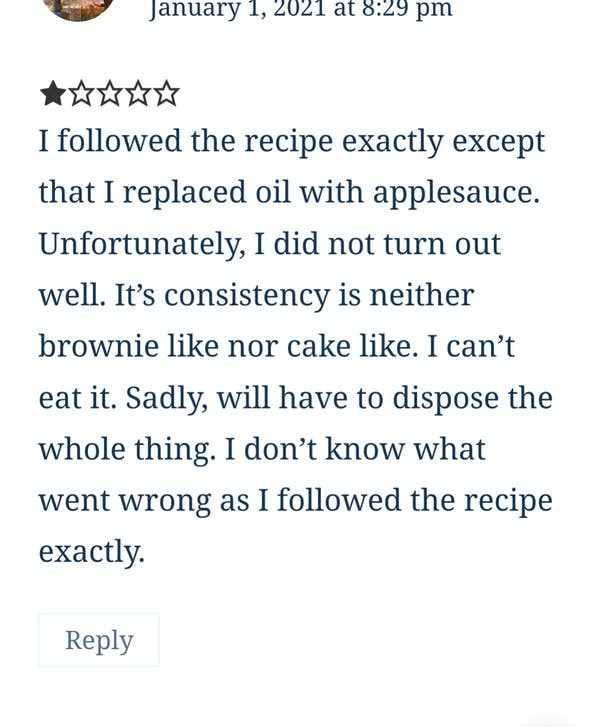“If you have never thought about absolutely anything, ever, this book is for you.”
—Manny

I sat at my computer looking out at the balding tree in front of my window, a space heater warming up my otherwise chilly office. As I tried to recall my most memorable one-star review, the one I have polished over time in my mind like a talisman, a familiar wave of dread washed over me. I would need to look up my reviews again to retrieve it.
How many new one-stars would be waiting?
I took a deep breath and dove in. It took about fifteen minutes to scan for all of the one- and two-star reviews for my three books, excluding the ones complaining that the book arrived dented or late. Afterward, I had the sensation I sometimes do of a weighted blanket on my chest, an actual heavy heart.
There was Manny’s one-star, still standing over a decade later (emphasis mine):
If you’ve never thought about absolutely anything ever this book is for you
November 3, 2012
I came into this book with a lot of enthusiasm . . . instead I got 300 pages of what seemed like listening to a complete moron talk about how stupid they are (my interpretation).
Seriously, 90% of the advice this woman gives is completely laughable as I would expect anyone who’s made it through college to already know these things. Her advice on dating and relationships are embarrassingly naive; they sound like a self-important 14 year old girl talking to her 8 year old sister about love. Please.
What’s more, it’s shocking someone with so many problems is a life coach. This woman is crazy, like the type of person you just try to have little to nothing to do with because of her stability issues (I wouldn’t be surprised if she lies crying on the ground for hours after reading this review).1
. . . In short, this book was more irritating than anything, unhelpful, a waste of time and money. There are much better books out there. Don’t bother with this thing.
Thankfully, I didn’t end up curled in a ball on the floor after reading. But because of the negativity bias built into our brain wiring, I never forgot his words—specifically the headline. Still, for every one-star there were one hundred positive notes that kept me writing and publishing.
In early December, I read two books in parallel during my blissfully dark, quiet morning reading sessions: Pulitzer prize-winning The Hours by Michael Cunningham (after finishing his newer pandemic novel, Day) and the “Instant New York Times Bestseller” You Could Make This Place Beautiful memoir by poet Maggie Smith.
As I enjoyed both books, I marveled at their prose, dog-eared favorite pages, and underlined notable passages. I pined after their vivid descriptions and attention to detail—a level of craft I could only dream about meeting someday, maybe, if I’m lucky.
As any author does while reading, I also wondered what doubts they had while writing. Would people see The Hours as derivative of Virginia Woolf’s Mrs. Dalloway, riding on her literary coattails? Would people view a memoir about divorce and rebuilding unfavorably, given how common it is?2
I couldn’t resist diving into both books’ Amazon and Goodreads reviews after finishing.3 Did these authors share my doubts, the same ones I would have had? Did some of their readers criticize them for precisely these reasons?
Reading another person’s one-star reviews is akin to watching reality TV: there’s a safe schadenfreude from the sidelines, learning from someone else’s public embarrassments, finding comfort in knowing that even bestsellers and pulitzers and book-to-movie sensations receive one-star reviews.
Even the most celebrated novels in the canon share a smattering of one-stars,4 and there’s a reason we’re entertained watching celebrities read their mean tweets aloud.
It’s cathartic seeing haters’ comments transmuted into beautiful art through the very same talent they tear down:
One-star reviews are a given. What to do with them? You could sue the critic or troll them by siccing your millions of followers on them. Or maybe you shouldn’t read reviews at all. If you can’t resist, you can at least wear them as a badge of honor that you have broken through the noise to be noticed at all.
In 2012, one year after my first book, Life After College, came out, I wrote a post called Inner Critic Incarnate: 6 Lessons From Negative Reviews (Hint: They Don’t Kill You!).
In it, I shared what remains the overriding reminder to myself to this day: that anything a one-star’er can tell me is something I already told myself while writing, something I had to accept and move past in order to publish at all.
I revisited this theme in Eleventh Hour Creative Gremlins on the Free Time podcast right after sending the finished PDF to the printer, when I was overcome by voices telling me how mediocre the manuscript—something a few one-stars would confirm post-publication, of course.5
It occurs to me that if given the choice, the Michael Cunninghams and Maggie Smiths and other lauded authors of the world would probably choose their bestseller status and Pulitzer prizes ten times out of ten, even knowing they come sandwiched with scathing—sometimes off-base but other times remarkably accurate—one-star reviews.
Most of the 65+ Doh posts I have published since launching this Substack last summer are followed by an intense vulnerability hangover the day after going live.6 For that reason—aka due to my fragile sensibilities—only paying subscribers can comment, and I don’t read the comments right away, even though every single one so far has been loving and helpful. Even if they weren’t, I would push myself to keep going.
The whole point of this Substack is to say the quiet parts out loud so that none of us feel quite as alone, dissolving the shame that sometimes accompanies struggle and liminal spaces.
Every time I post, I worry about three things simultaneously:
That I myself am not likable—maybe I’m intolerable, delusional, and/or entitled
That the story I’m telling that day is boring or unreliable, and/or
That my writing skill isn’t up to par—someone else could tell it better or smarter.
Although it would be wonderful not to have these worries at all, they do help make the posts better by the time they reach you.
All I can say to the Mannys of the world is this:
While I wish I was a goddess of craft and perfect literary chops, I am not. I am doing the best with what I’ve got, erring on the side of hitting publish at a pace of 51/49. If that’s not good enough for you, I completely understand. Feel free to keep moving, and I will do the same.
As my wise friend Petra Kolber reminded me years ago, “The world needs your imperfect voice more than your perfect silence.”7
❤️
If Manny thought I was unstable then, should we tell him about Rolling in Doh?! 😭😭😭
I was at least pretending to keep things composed and professional back then. Now I’m joining
On the topic of divorce, just this week New York Magazine’s The Cut published an essay from the guaranteed-to-spark-controversy essayist Emily Gould, formerly of Gawker, on The Lure of Divorce. As per usual for her posts, the comments section is on fire.
I couldn’t help but wonder if Emily reads them? Is it horrible to have her worst fears (and possibly truths) about herself reflected back to her in such biting, intelligent, specificity—while documenting her mental health crisis very much still in process? Is it worth sharing so openly about her life, even with commenters saying things like:
“Oh Emily Gould. Much as I enjoyed rubber-necking on your life, you need to immediately invent a time machine, go back in time, and not write this essay.”
If you are imagining my horror at receiving such snark if/when I ever put my story on the line more publicly, you are correct. These comments have a second-hand silencing effect.
At what point are the costs for “cannibalizing our lives for content” too high, as my friend
shared on the Pivot and Free Time podcasts?For more on the good, bad, and ugly of Goodreads:
A few favorites from the linked piece in The Morning News:
The Lord of the Rings by J.R.R. Tolkien (1954)
“The book is not readable because of the overuse of adverbs.”Mrs. Dalloway by Virginia Woolf (1925)
“The only good thing to say about this “literary” drivel is that the person responsible, Virginia Woolf, has been dead for quite some time now. Let us pray to God she stays that way.”1984 by George Orwell (1948)
“Don’t listen to anyone who tries to distinguish between “serious” works of literature like this one and allegedly “lesser” novels. The distinction is entirely illusory, because no novels are “better” than any others, and the concept of a “great novel” is an intellectual hoax. This book isn’t as good as Harry Potter in MY opinion, and no one can refute me. Tastes are relative!”Tropic of Cancer by Henry Miller (1934)
“This book is one of the worst books I have ever read. I got to about page 3-4.”
You can listen to my solo episode on Eleventh-Hour Creative Gremlins here:
For more of Petra’s genius, check out her book The Perfection Detox, and our Pivot podcast conversation:
If you enjoyed this post, you might also appreciate:
⚾️ The Business Yips & 51/49
It’s Spring of 1999, and I’m a sophomore in high school, standing at second base. My right hand is balled into a fist, nervously grinding back-and-forth along the smooth interior of the black leather Wilson glove on my left. My cleats are light on the infield dirt as I lean my weight into my toes, knees deeply bent, eyes squinting ahead in focus. I sway…
Ignore the Odds
✍️ Saturday, July 1 “Startup CEOs should not play the odds. When you are building a company, you must believe there is an answer and you cannot pay attention to your odds of finding it. You just have to find it. It matters not whether your chances are nine in ten or one in a thousand; your task is the same.”













I love your friend Petra’s reminder! Such a good one. And this, exactly:
“The whole point of this Substack is to say the quiet parts out loud so that none of us feel quite as alone, dissolving the shame that sometimes accompanies struggle and liminal spaces.”
If only I could tell you how inspiring, empowering, and kind your words have been to me in the last five years or so. All the Mannies out there are free to buy a book and don’t like it, just as much as they’re welcome to move on. There’s so many folks out there who cheer you on and are interested in hearing what you’ve gotta say. Let them Mannies be *and* let yourself do you 🧡
1. Oh my goodness, really Manny!? #dislike.
2. The Devin R response -- so fascinating! Especially since he sells this merch. “Stay snug and spread love, ideal for everyday wear.”
3. I’m going to go read the Emily piece now -- thanks for sharing.
In my case the 1 star reviews (real or metaphorical) never really get easier per se (I think I’ve always been a sensitive person at my core, even since I’ve been very young) but they have almost always taught me something about what I have said yes and no to, or how I arrived at that point. This past year, the couple of non-constructive and non-actionable negative reviews/comments I received came from a specific commitment that I shouldn’t have ever actually committed to -- which was a powerful reminder!
Thanks for sharing -- great post and related links!! ❤️